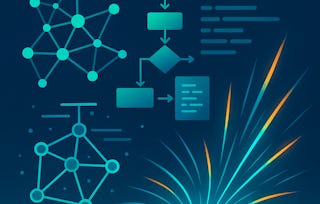Big data is the area of informatics focusing on datasets whose size is beyond the ability of typical database and other software tools to capture, store, analyze and manage. This course provides a rapid immersion into the area of big data and the technologies which have recently emerged to manage it.

Big Data Technologies

Empfohlene Erfahrung
Was Sie lernen werden
Understanding and identifying use cases and domains of Big Data problems
Selecting and implementing technical solutions involving Big Data systems
Develop and use various open source software systems (Apache) in the Big Data tech stack
Operate and run various cloud computing software services (AWS) in the Big Data infrastructure space
Kompetenzen, die Sie erwerben
- Kategorie: Software Design Patterns
- Kategorie: Big Data
- Kategorie: Data Infrastructure
- Kategorie: Cloud Computing
- Kategorie: Data Ethics
- Kategorie: Databases
- Kategorie: Informatics
- Kategorie: Distributed Computing
- Kategorie: Data Management
- Kategorie: Apache Spark
- Kategorie: Real Time Data
- Kategorie: Apache Kafka
- Kategorie: Apache Hadoop
- Kategorie: Data Lakes
- Kategorie: Apache Cassandra
- Kategorie: Apache Hive
- Kategorie: NoSQL
- Kategorie: MongoDB
- Kategorie: Data Storage
- Kategorie: Data Processing
- Der Fähigkeiten-Abschnitt ist eingeklappt. 12 von 20 Fähigkeiten werden angezeigt.
Wichtige Details

Zu Ihrem LinkedIn-Profil hinzufügen
54 Aufgaben
Erfahren Sie, wie Mitarbeiter führender Unternehmen gefragte Kompetenzen erwerben.

Erweitern Sie Ihre Fachkenntnisse
- Lernen Sie neue Konzepte von Branchenexperten
- Gewinnen Sie ein Grundverständnis bestimmter Themen oder Tools
- Erwerben Sie berufsrelevante Kompetenzen durch praktische Projekte
- Erwerben Sie ein Berufszertifikat zur Vorlage

In diesem Kurs gibt es 9 Module
Welcome to Big Data Technologies! In Module 1, students will develop a foundational understanding of analytic data, its inherent value, and the methods to transform raw data into valuable insights. This module covers the challenges of handling large datasets, including their collection, processing, and analysis, while providing a comprehensive overview of Big Data's origins, properties, and real-world applications. Additionally, students will explore the economic, logistical, and ethical concerns associated with Big Data, alongside the professional advantages for data scientists proficient in Big Data analysis.
Das ist alles enthalten
16 Videos10 Lektüren8 Aufgaben1 Diskussionsthema
Module 2 introduces students to the challenges of building and managing distributed systems for big data storage and processing. It covers Hadoop’s origins, concepts, core components, and key characteristics, while exploring the Hadoop ecosystem's tools and services. Students will gain an understanding of distributed file systems, specifically HDFS, YARN's resource management, and various technologies for effective big data storage and organization.
Das ist alles enthalten
13 Videos7 Lektüren6 Aufgaben
In Module 3, students will explore the differences between processing small to moderate versus massive data volumes through distributed computing. This module covers the key concepts of the MapReduce framework, including how it breaks down large data processing tasks into smaller, parallel tasks for efficient execution. Students will also learn about the phases of MapReduce, the role of map and reduce functions, optimization patterns, and the benefits and limitations of various development approaches, including Java-based MapReduce and Hadoop Streaming.
Das ist alles enthalten
18 Videos8 Lektüren7 Aufgaben
In Module 4, students will explore Apache Spark as a powerful distributed processing framework for interactive, batch, and streaming tasks. This module covers Spark's core functionalities, including machine learning, graph processing, and handling structured and unstructured data, while highlighting its in-memory processing potential and unified nature. Students will compare Spark with MapReduce, learn about Spark's primary components, execution architecture, Resilient Distributed Datasets (RDDs), DataFrames, Datasets, and the various methods for creating and optimizing DataFrames for efficient data processing.
Das ist alles enthalten
25 Videos7 Lektüren6 Aufgaben
In Module 5, students will delve deeper into Spark's capabilities for data manipulation and transformation. The module covers essential operations such as selecting, filtering, and sorting data, as well as joining DataFrames and performing aggregations. Students will also learn about handling null values, using Spark SQL for data queries, and optimizing performance with caching. Practical applications include creating and manipulating DataFrames, executing transformations and actions, and efficiently writing data to various formats.
Das ist alles enthalten
19 Videos11 Lektüren10 Aufgaben
Module 6 introduces students to the limitations of batch processing and the significance of real-time data processing. It covers essential aspects of stream processing, including data ingestion and analysis, with a focus on tools like Apache Kafka for stream ingestion and Spark Structured Streaming for scalable and fault-tolerant data processing. Students will also explore various design patterns for organizing big data clusters, the concept of data lakes, and the Lambda Architecture for unifying real-time and batch data processing in modern data environments.
Das ist alles enthalten
16 Videos6 Lektüren6 Aufgaben
In Module 7, students will explore the benefits and limitations of relational databases in big data contexts and the concept of distributed database systems. This module covers NoSQL databases, their diverse data models, and their scalability and flexibility advantages. Students will also learn about real-world use cases, data partitioning, consistency models, and the CAP Theorem, gaining a comprehensive understanding of how NoSQL databases manage large datasets across clusters while ensuring scalability and availability.
Das ist alles enthalten
18 Videos6 Lektüren6 Aufgaben
In Module 8, students will explore specific NoSQL databases types – namely Key-Value, Wide-Column, and Document databases. Two similar systems, HBase and Cassandra, will be studied and contrasted in the context of the CAP theorem and associated CP/AP trade-offs. Topics such as consistency and availability will be discussed in the context of specific usage scenarios for both HBase and Cassandra – and general application domains of both systems will be highlighted. Finally, the document database MongoDB will be reviewed in the context of natural language/text processing use cases – and MongoDB usage and architecture will be analyzed with respect to traditional RDBMS.
Das ist alles enthalten
9 Videos4 Lektüren4 Aufgaben
This module contains the summative course assessment that has been designed to evaluate your understanding of the course material and assess your ability to apply the knowledge you have acquired throughout the course.
Das ist alles enthalten
1 Aufgabe
Erwerben Sie ein Karrierezertifikat.
Fügen Sie dieses Zeugnis Ihrem LinkedIn-Profil, Lebenslauf oder CV hinzu. Teilen Sie sie in Social Media und in Ihrer Leistungsbeurteilung.
Auf einen Abschluss hinarbeiten
Dieses Kurs ist Teil des/der folgenden Studiengangs/Studiengänge, die von Illinois Techangeboten werden. Wenn Sie zugelassen werden und sich immatrikulieren, können Ihre abgeschlossenen Kurse auf Ihren Studienabschluss angerechnet werden und Ihre Fortschritte können mit Ihnen übertragen werden.¹
Dozent

Mehr von Software Development entdecken
 Status: Vorschau
Status: Vorschau Status: Vorschau
Status: VorschauO.P. Jindal Global University
 Status: Kostenloser Testzeitraum
Status: Kostenloser TestzeitraumYonsei University
 Status: Kostenloser Testzeitraum
Status: Kostenloser TestzeitraumUniversity of Pittsburgh
Warum entscheiden sich Menschen für Coursera für ihre Karriere?

Felipe M.

Jennifer J.

Larry W.

Chaitanya A.

Neue Karrieremöglichkeiten mit Coursera Plus
Unbegrenzter Zugang zu 10,000+ Weltklasse-Kursen, praktischen Projekten und berufsqualifizierenden Zertifikatsprogrammen - alles in Ihrem Abonnement enthalten
Bringen Sie Ihre Karriere mit einem Online-Abschluss voran.
Erwerben Sie einen Abschluss von erstklassigen Universitäten – 100 % online
Schließen Sie sich mehr als 3.400 Unternehmen in aller Welt an, die sich für Coursera for Business entschieden haben.
Schulen Sie Ihre Mitarbeiter*innen, um sich in der digitalen Wirtschaft zu behaupten.
Häufig gestellte Fragen
To access the course materials, assignments and to earn a Certificate, you will need to purchase the Certificate experience when you enroll in a course. You can try a Free Trial instead, or apply for Financial Aid. The course may offer 'Full Course, No Certificate' instead. This option lets you see all course materials, submit required assessments, and get a final grade. This also means that you will not be able to purchase a Certificate experience.
When you enroll in the course, you get access to all of the courses in the Specialization, and you earn a certificate when you complete the work. Your electronic Certificate will be added to your Accomplishments page - from there, you can print your Certificate or add it to your LinkedIn profile.
Yes. In select learning programs, you can apply for financial aid or a scholarship if you can’t afford the enrollment fee. If fin aid or scholarship is available for your learning program selection, you’ll find a link to apply on the description page.
Weitere Fragen
Finanzielle Unterstützung verfügbar,

